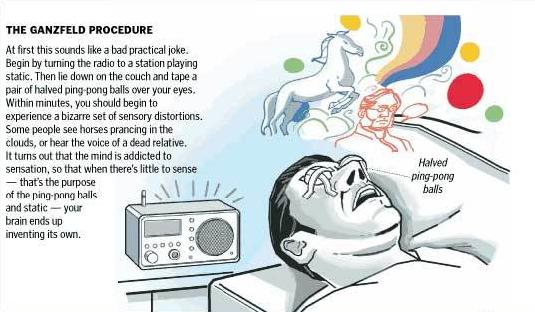Say the word hallucinate and the first thing that comes to are drugs. Psychedelics and their image as dangerous have led the word hallucination to be rife with negative connotations. However, hallucinating itself isn’t a dangerous act. It allows you to expand your mind and help you make sense of exactly who you are.
Mainstream media has tried to demonize hallucinations as a symptom of mental health issues or mental instability. Although uncontrollable visions can be a sign of a deeper issue, using a controlled technique can be hugely beneficial. Daydreams become reality, allowing us to put a plan together of how to realise our dreams when we return to ‘reality.’
If you’re looking for a natural way to delve more deeply into your own psyche through hallucinations, the Ganzfeld effect could be the force that liberates your consciousness from our perceived reality.
What is the Ganzfeld effect?
The Ganzfeld effect was first theorized in the 1930s by a psychologist by the name of Wolfgang Metzger (1899-1979), although it has roots in Ancient Greek culture. The term when translated from German into English means complete field, an apt title given its ability to allow you to access the hidden depths of your brain, through a process of complete sensory deprivation.
Metzger decided to test the theory that a complete shut off from your external senses (sight and hearing) would open up the brain for further activity. The Greeks had begun the idea by retreating to pitch black caves to hallucinate, as well as modern stories of trapped miners experiencing visions as a result of the perpetual darkness they lived in. Most interestingly, arctic explorers staring out at an unalterable expanse of white have been shown to experience an altered state of mind by their conditions.
By experimenting on his patients Metzger found that time and time again that a lack of sensory activity could bring on hallucinations. His patients would be blindfolded with a paper blindfold and sat in a silent room, freeing their minds to wander from reality and allow them to create vivid, realistic imagery. He showed that hallucinations occurred at a much higher rate in evenly lit rooms, as the pitch black is more likely to cause the brain to begin the processes associated with sleep.
It has subsequently become ‘psychological fact’ that a featureless field of vision can bring about healthy hallucinations. Given the simplicity of the theory, it may not come as a surprise that you can replicate the idea at home.
How to naturally hallucinate at home
Replicating the Ganzfeld effect at home is surprisingly simple and certainly doesn’t require you to invest in any specialized scientific equipment.
Items needed:
- A ping pong ball
- Noise cancelling headphones
- A radio
- An evenly lighted room (overhead lights and no bright colours on the walls, light colour palette preferred)
Instructions:
- Cut the ping pong ball in half, so that you have two evenly sized hemispheres
- Set the radio to a frequency with no station; you should play the static sound
- Ensure only the overhead lights are on
- Plug the headphones into the radio and play at a low volume, but loud enough to block out any other sound
- Tape the two halves of the ping-pong balls over your eyes. It’s a good idea to line the edges with tape as well, so they’re smooth against your skin.
- Allow your mind to wander and be patient.
The power of your imagination and the deep crevices of your mind are opened when you remove yourself from the reality that we all live in each day, which is filled with a constant flurry of noise and images. Whether you are able to ‘see’ on the first attempt is difficult to predict but remain patient and consider it an exercise in exploring your mind.
The ‘reality’ we see before us each day is shaped and moulded by the way our minds perceive it. By depriving our senses for a short period a couple of times a week we might find that we better understand the true nature of the world we live in.
Sources
http://www.instructables.com/id/Ganzfeld-Hack-Your-Brain-the-Legal-Way/
https://mindhacks.com/2008/11/17/ganzfeld-hallucinations/
http://www.iflscience.com/brain/five-cool-ways-trick-your-brain/

